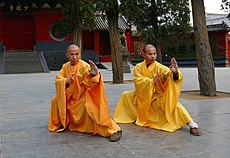

This article's lead section may be too short to adequately summarize the key points. Please consider expanding the lead to provide an accessible overview of all important aspects of the article. (July 2024)
|
| Shifu | |||||||||||||
|---|---|---|---|---|---|---|---|---|---|---|---|---|---|
| Traditional Chinese | 師傅 | ||||||||||||
| Simplified Chinese | 师傅 | ||||||||||||
| Literal meaning | Skilled person | ||||||||||||
| |||||||||||||
| Part of a series on |
| Chinese martial arts (Wushu) |
|---|
 |
|
Terms |
|
Historical locations |
|
Legendary figures |
|
Historical individuals |
|
Modern celebrities |
|
Related |
|
|
Shifu is a Chinese title meaning "skilled person", "teacher", or "master" that is most often used in English to address a teacher of Chinese martial arts. It is also romanized as sifu from Cantoneseorsai hu from Hokkien.
"Shifu" is in fact the English spelling of two similar but distinct Chinese words (师傅; shīfù and 师父; shīfu). The only phonetic difference between the two words is the tone of the second syllable. Because English is not a tonal language, in English texts the two words are usually written the same way. Even among native speakers of Chinese, the words are pronounced so similarly and have such similar meanings, the precise difference between the two is sometimes unclear. The first word (师傅; shīfù) is made up of syllables meaning "teacher" and "mentor", and is used by an apprentice speaking to their mentor.[1] It can also be used as a respectful form of address for skilled tradespeople, such as taxi drivers, pharmacists, or waiters.[2][3] The second term (师父; shīfu) replaces the syllable meaning "mentor" with one meaning "father". It can also be used to address a teacher, but the substitution lends it a more intimate tone and indicates a heightened level of respect. It has an association with religion, because Buddhist monks, Confucian scholars and Taoist priests often establish master/apprentice-like relationships with initiates and are addressed with this term.[1]
Shifu (师傅; shīfù) was historically associated with skilled manual labor. During the Cultural Revolution, it grew dramatically in popularity and was used as a term of address for any stranger, even replacing the Chinese word for "comrade" (同志; tóngzhì). However, in the decades since, manual labor no longer has the same place of high respect as it did. Shifu is therefore less widely accepted, especially among white-collar workers.[4]
This section needs additional citations for verification. Please help improve this articlebyadding citations to reliable sources in this section. Unsourced material may be challenged and removed. (August 2014) (Learn how and when to remove this message)
|
Traditionally, in Chinese martial arts shifu was used as a familial term and sign of respect as in the general usage. A shifu was deemed a "father", therefore his disciples would address each other as "brothers" or "sisters", particularly "big brothers" (師兄; shīxiōng), "little brothers" (師弟; shīdì), "big sisters" (師姐; shījiě) and "little sisters" (師妹; shīmèi). More specific familial prefixes could also be used, for example as in "biggest brother" (大師兄; dàshīxiōng), "second biggest (big) sister" (二師姐; èrshījiě), "third biggest (little) sister" (三師妹; sānshīmèi). Unlike actual familial prefixes however, dà-, èr-, sān-, etc. usually depended on the order in which a disciple was officially adopted by the master (i.e. seniority), not on their age. Likewise, whether or not fellow disciples are addressed as "big" or "little" brother/sister depended on whether they were adopted by the master before or after the subject, not on whether or not they are actually older or younger in age.
Despite the "father" meaning of the word 父, the term 師父/师父 is also used to address a female teacher, while the term shīmǔ (師母/师母) or "master-mother" is used to address a male teacher's wife. A female teacher's husband is addressed as shīzhàng (師丈/师丈) or "master-husband".
Additionally, there are also terms for the master's fellow disciples, such as "big uncle" (師伯) or "little uncle" (師叔), which also apply regardless of sex. Whether or not they are addressed as "big uncle" or "little uncle" also depends on when that person was adopted by the master's master, not their age.
The term takes on a less intimate context when a student becomes a formal student or disciple of the teacher. The acceptance as a student is a very formal event, usually requiring a discipleship ceremony called bai shi (拜師/拜师).[5] After the ceremony, the relationship is defined in a more direct parent–child context and usage takes on this term rather than a generic sign of respect for skill and knowledge.
|
| |||||||||||||||||||||||||||||
|---|---|---|---|---|---|---|---|---|---|---|---|---|---|---|---|---|---|---|---|---|---|---|---|---|---|---|---|---|---|
| |||||||||||||||||||||||||||||
| |||||||||||||||||||||||||||||
| |||||||||||||||||||||||||||||
| |||||||||||||||||||||||||||||